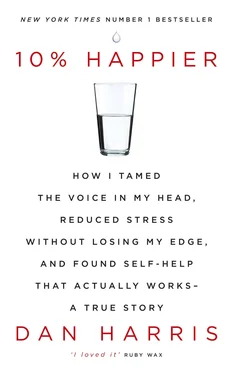While I was unable to hold it together in the face of the crying father, walking out of camera range with a lump in my throat, I was surprised by my overall reaction to the horrors of war—or, more accurately, my lack of reaction. As far as I could tell, I was not that shaken. I convinced myself this kind of psychological distance was a job requirement, like the doctors from M*A*S*H who cracked jokes over the patients on their operating table. I reckoned reportorial remove served a higher purpose, allowing me to more effectively convey urgent information. If I broke down every time I saw something disturbing, how could I function?
Back home, people would ask me whether my experiences overseas had “changed” me. My reflexive answer was: no. The old line “Wherever you go, there you are” seemed to apply. I was still the same; I just had the proverbial front-row seat at history. My parents openly worried about whether I was traumatized by what I’d seen, but I didn’t feel traumatized at all. Quite the opposite; I liked being a war correspondent. Loved it, in fact. The bodyguards, the armored cars, being driven around like I was a head of state. I also liked the way flak jackets made my diminutive frame look larger on TV. In a war zone, the rules are suspended. You ignore traffic lights, speed limits, and social niceties. It has an illicit, energizing feel not unlike being in a major city during a blackout or a blizzard. And then, of course, there’s the added romance of risk. We used to repeat to one another bastardized versions of an apt old quote from Winston Churchill: “Nothing in life is so exhilarating as to be shot at without result.”
It wasn’t just the rush I enjoyed. I also genuinely believed in the importance of what we were doing, bearing witness to the tip of the American spear. I felt a sense of purpose—that this was a cause that merited the risk. For both of these reasons—the thrill and the principle—I freely engaged in ABC’s notorious intramural battles in order to stay in the game. An outsider might assume that we journalists spend most of our time competing with people from other networks. In actuality, we expend most of our energy competing with our own colleagues. In order to retain my spot on the front lines, I found myself vying against fellow correspondents like David Wright, another young reporter who’d recently arrived from local news. He was aggressive and smart, and I kind of resented him for it.
While I’d once been content to let the senior folks fight it out for the big stories, I was now much more assertive. This competition mostly took the form of overt lobbying—phone calls and emails to the anchors and executives who make the assignments. While the internal wrangling was, in many ways, a sign of a healthy, vibrant organization, it was also stressful and provoked me to dedicate way too many hours to measuring myself against people I worked with. For example, during a period in which David was kicking ass over in Afghanistan and I was stuck in New York, I could barely bring myself to watch the news.
Fighting over airtime in the middle of a war was perverse, but such was the nature of the gig, it seemed to me. The great blessing of being a journalist is that you get to witness world events—to interface with the players, to experience the smells and tastes of it all. The great curse, though, is that, as I’d learned on 9/11, you come to see these events, at least in part, through the lens of self-interest. Did I get to go? Did I perform well? This psychology was not discussed much in all the autobiographies of legendary journalists that I’d read, but it was nonetheless real. Peter had epic rivalries with fellow anchors like Ted Koppel. The news division had been structured by its preceding president, Roone Arledge, as a star system with competing fiefdoms battling over scarce resources like big interviews and the best correspondents. When Wright and I were both angling to be the first into Iraq after the fall of Baghdad, Peter even called me and made approving jokes about my sharp elbows.
In an environment that was permissive of pique, I sometimes let my temper get the better of me, a tendency that dated back to my early twenties. When I was a young anchorman in Boston, I once threw my papers in the air during a commercial break to express my frustration over a technical glitch. Shortly thereafter, my boss called me into his office to warn me, “People don’t like you.” That meeting sent my heart into my throat and forced me to correct my behavior. But there continued to be room for improvement; as a network correspondent, I was still occasionally snippy with colleagues, and even, on a few occasions overseas, downright stupid. Like the time I was in the middle of a crowded, angry street demonstration in Pakistan and engaged in a supremely unwise shouting match with a protestor who’d just told me the Israelis were behind 9/11. The one situation in which my peevishness remained firmly bottled up was, of course, when dealing with Peter Jennings himself.
On a muggy July day in 2003, I got out of a taxi in front of my apartment building on the Upper West Side, having just wrapped up a five-month stay in Iraq, a posting that stretched from the months before the U.S. invasion all the way up to the beginning of the insurgency. It was strange to be back from the desert, in a world of deciduous trees, a place where I no longer required an entourage. The doormen looked at me with surprise, and I sensed that they were struggling to remember my name. I rolled my bag down the hallway of the fourteenth floor and opened the door to the “home” I’d scarcely visited in two years. The place was pathetic, decorated like a college dorm room, and with stacks of unopened mail all over the place. I’d been away so long that I’d missed the transition to DVDs—I still had one of those big, boxy televisions with a VHS player in it. I hadn’t come to the end of my overseas assignments, but the powers that be had decided that now was the time for me to focus more on domestic priorities, like covering the 2004 presidential campaign and trying my hand at the anchor desk.
Meanwhile, my personal life was a blightscape. While I had been abroad, the already limited social network I’d maintained outside of work had largely evaporated. I was in my early thirties, and my friends had all coupled up and hunkered down. People my age were maturing, nesting, and reproducing. I, by contrast, had just endured an epic breakup after a short, fiery relationship with a Spanish journalist I’d met in Iraq. But I was so focused on work that romantic stability wasn’t even on my list of priorities.
Not long after I got home, I developed a mysterious illness with flulike symptoms. I felt tired and achy all the time, I was perpetually cold, and I had trouble getting out of bed. I’d always been a little bit of a hypochondriac, but this was different. It dragged on for months. I convened lengthy, medical symposia over the phone with my parents. I got tested for tropical diseases, Lyme disease, and HIV. There was even talk of chronic fatigue syndrome.
When all the tests came back negative, I latched on to the theory that my apartment had a gas leak, and I paid an exorbitant fee to get the place tested. For a few nights, I slept on the floor at the apartment of my close friend Regina, whom I’d known since college. She was a law school grad who had started a legal headhunting company. Throughout the night, her miniature pinscher would bring his kibble next to my head and chew it in my ear. Ultimately, the test results showed there was no leak. At which point I jokingly said to Regina that if I didn’t find a diagnosis soon, I might have to admit that I was crazy.
When I finally broke down and went to see a psychiatrist, he took about five minutes to deliver his verdict: depression. As I sat on the couch in this cozy Upper East Side office, I insisted to the kindly, sweater-wearing shrink that I didn’t feel blue at all. He explained that it is entirely possible to be depressed without being conscious of it. When you’re cut off from your emotions, he said, they often manifest in your body.
Читать дальше












